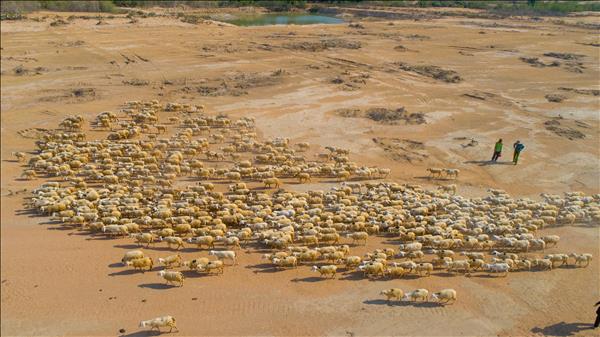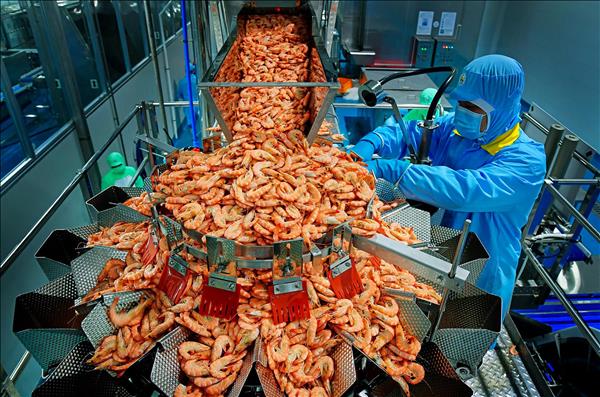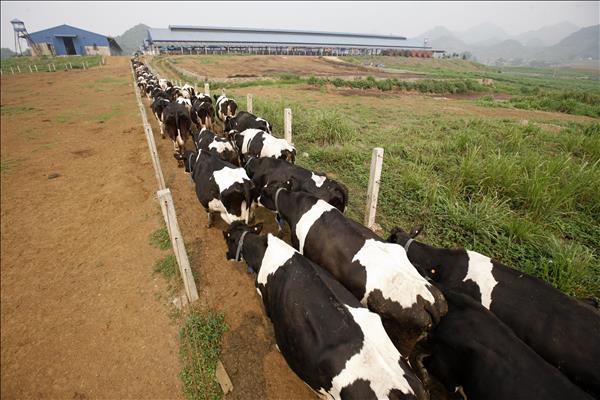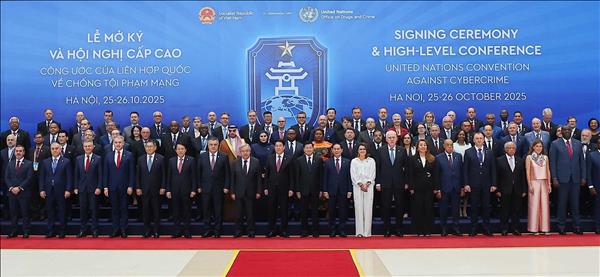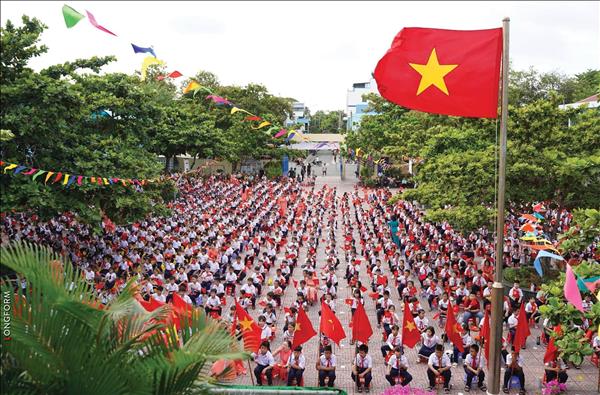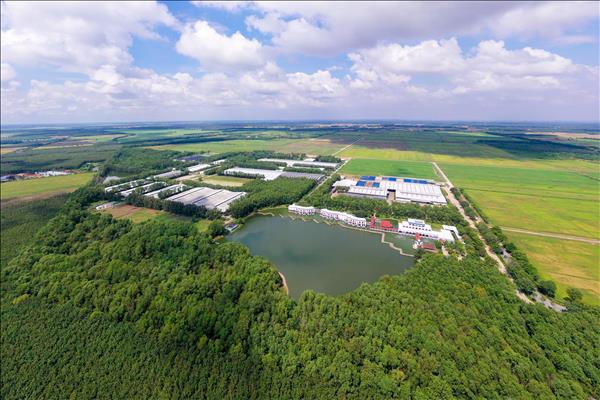Prime Minister Nguyen Xuan Phuc arrived in Hanoi on October 21, wrapping up his working trip to attend the 12th Asia-Europe Meeting Summit (ASEM 12) and the Partnering for Green Growth and the Global Goals 2030 (P4G) Summit, and visit Austria, Belgium and Denmark from October 14-21.
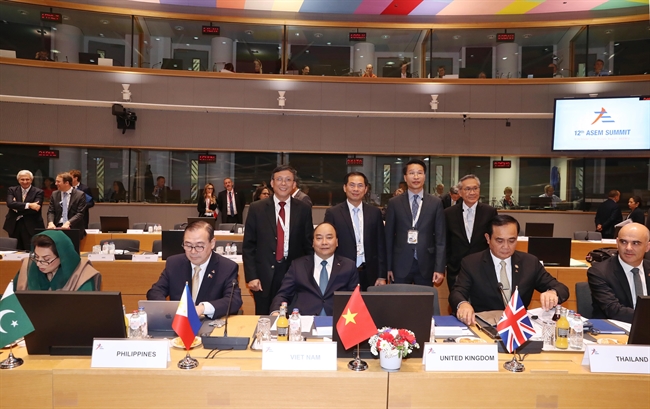 Prime Minister Nguyen Xuan Phuc attends the plenary session of the 12th ASEM Summit. Photo: Thong Nhat/VNA 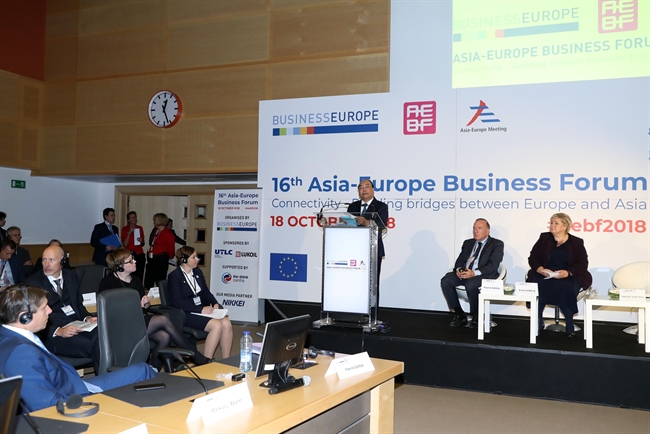 The Vietnamese leader addresses the 16th Asia-Europe Business Forum (AEBF 16) in Brussels. Photo: Thong Nhat/VNA 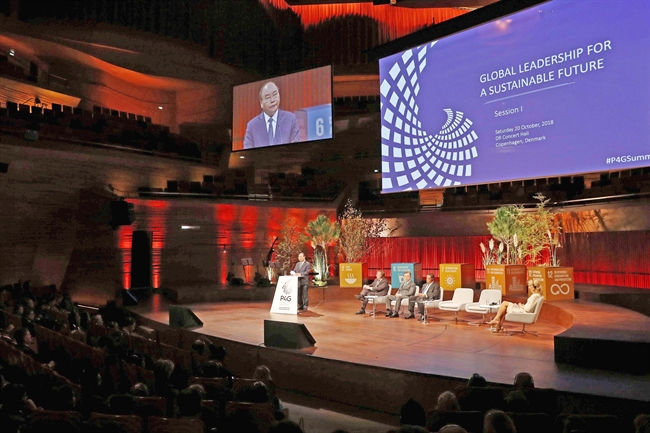 He attends the opening session of the Partnering for Green Growth and the Global Goals 2030 (P4G) Summit in Copenhagen. Photo: Thong Nhat/VNA 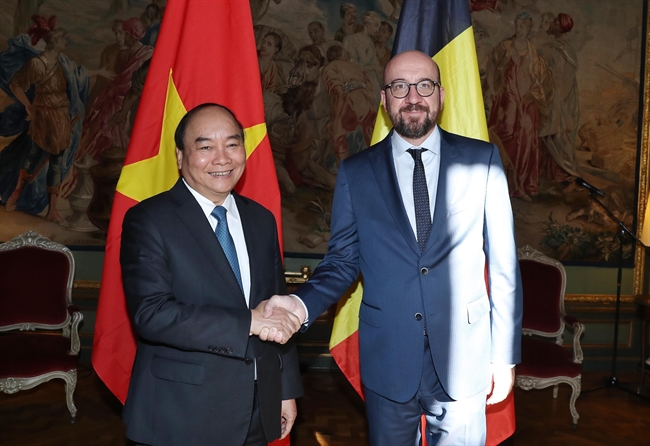 Belgian Prime Minister Charles Michel hosts a welcoming ceremony for and holds talks with his Vietnamese counterpart in Brussels. Photo: Thong Nhat/VNA 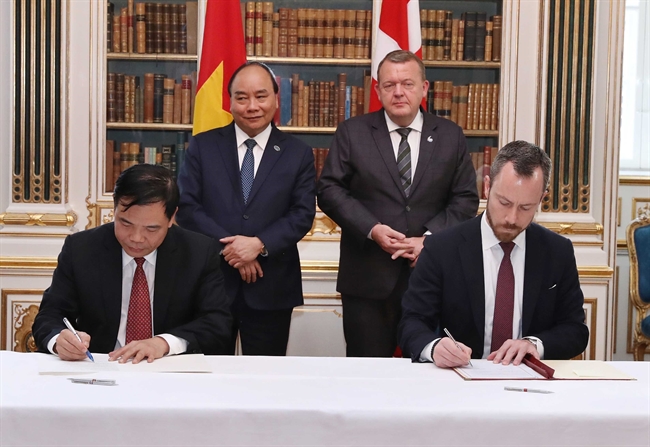 Prime Minister Nguyen Xuan Phuc and his Danish counterpart Lars Lokke Rasmussen witness the signing of an agreement on sustainable development and food safety. Photo: Thong Nhat/VNA 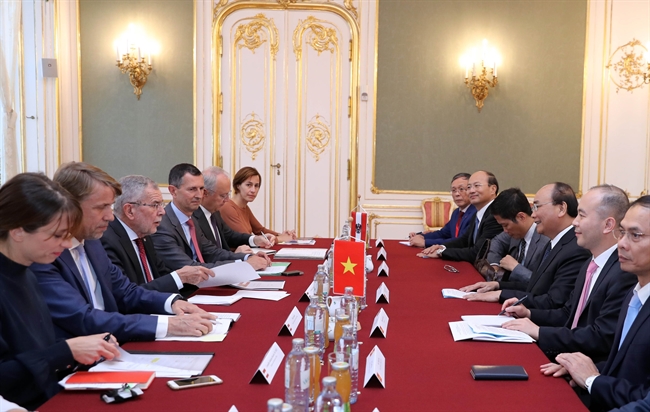 The Vietnamese leader has meeting with Austrian President Alexander Van der Bellen in Vienna. Photo: Thong Nhat/VNA |
During the week-long tour, the PM conducted nearly 70 multilateral and bilateral activities within the framework of the ASEM 12 and P4G Summit, held a working session with the European Commission and visited Austria, Belgium and Denmark.
At the 12th ASEM in Belgium, the PM made a speech at a plenary session themed “Reinforcing the Multilateral System: Advancing the ASEM Partnership on Global Issues”.
Attending the first P4G Summit in Denmark, the PM conveyed a strong message of the importance of strengthening global cooperation in achieving global green growth goals till 2030.
The leader also held talks with his Austrian, Belgian and Danish counterparts and EU President to make new strides in bilateral ties.
Under his witness, representatives from Vietnam and Austria, Belgium, Denmark and the EU signed 30 documents and cooperation agreements in diverse areas.
During talks with the PM of Austria, who is now Chair of the EU, both sides agreed on measures to turn Austria into one of the leading European economic partners of Vietnam.
According to the Ministry of Industry and Trade, two-way trade between Vietnam and Austria has grown in recent years, surpassing 4 billion US dollars in 2017. Vietnam’s exports to Austria include telephones and spare parts, footwear, wood and wooden products, garments, machines, equipment and spare parts. Meanwhile, the country imports pharmaceuticals, machines, equipment, steel, paper, animal feed, and materials from Austria.
Austria is the 6th largest importer of Vietnam in Europe. Vietnam earned 2.58 billion US dollars from shipments to the central European country in the first seven months of 2018, up 47% year on year, while spending 167 million US dollars purchasing Austrian goods, 16% lower than the same time last year.
By August 2018, Austria ranked 43rd among 129 countries and territories investing in Vietnam, with 31 valid projects valued at 143.9 million US dollars. Most of the projects are of small and medium sizes, focusing on processing, manufacturing, hotels, restaurants, and entertainment.
In talks with the Belgian PM, the two prime ministers pledged to strengthen economic ties and maintain cooperation mechanisms such as Vietnam-Belgium Joint Committee on Economic Cooperation. On the occasion, both sides officially established strategic partnership in agriculture.
Though being only a small country, Belgium has served as an important gateway for Vietnam’s commodities to access other Western European nations.
Belgium is Vietnam’s seventh largest trading partner in the EU, with two-way trade reaching 2.7 billion US dollars last year. As of August 2018, Belgium’s investment in Vietnam was valued at 900 million US dollars. Meanwhile, Vietnam has invested in two projects in Brussels, including a trade promotion center capitalized at 152,000 US dollars in Brussels and the Europe trade and investment joint stock company worth 90,000 US dollars.
While in talks with the Danish PM, the two sides debated specific measures to further deepen bilateral comprehensive partnership.
Two-way trade reached 664.6 million US dollars in 2017. Vietnam exports garments-textiles, footwear, timber products, metals, handicrafts, electric equipment and coffee to Denmark, while importing dairy products, equipment and machines, chemicals, pharmaceutical products and seafood from the country.
Denmark is one of the first North European countries to invest in Vietnam. The country ranks 26th out of 129 countries and territories making investment in the Southeast Asian nation with 132 projects valued at more than 686 million US dollars. The most outstanding projects include the Cai Mep International Terminal worth 268.6 million US dollars, the 79.6 million-US dollars Southeast Asia beer factory, and 50 million-US dollars Nisan Vietnam Ltd., Co. specializing in wholesale, retail and repair services.
Denmark is also one of the first western nations to provide development assistance to Vietnam and among the biggest providers of non-refundable official development assistance (ODA) capital. Since 1972, the country has funded more than 1 billion US dollars in ODA for Vietnam, about 64 million US dollars each year.
|
In the first half of 2018, Vietnam exported 132,000 tons of pepper worth 453 million US dollars, mostly to Europe and America. Photo: VNP 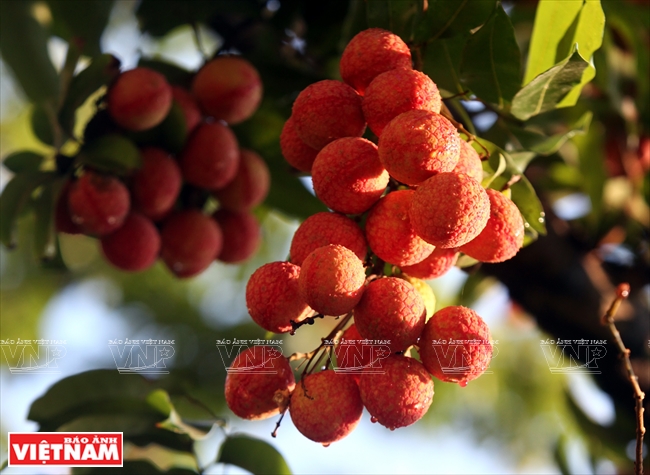 Two batches of litchi from Hong Giang Cooperative were exported to the EU and US by air in 2018. Photo: VNP In the eight first months of 2018, coffee exports, mostly to Europe, reached 153,300 tons, worth 282.16 million US dollars, up 59.5% in quantity and 25.5% in value. Photo: VNP 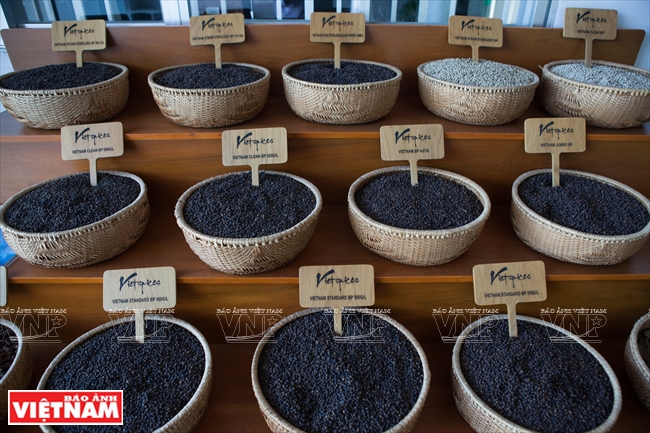 Europe is a large importer of Vietnamese pepper. Photo: VNP Vietnam’s tuna exports to the EU had by March increased 25% year on year to 34.5 million US dollars. Photo: VNP 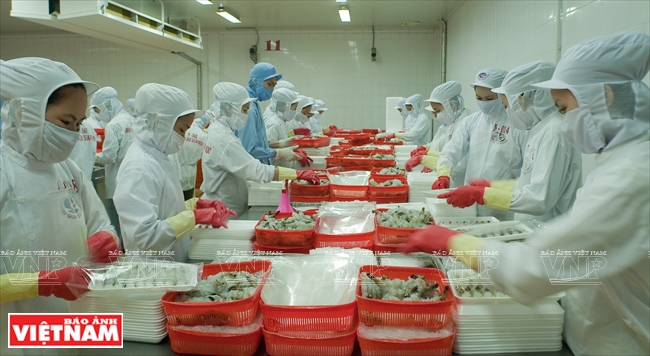
The Netherlands and the UK had by May been the two largest European importers of Vietnamese seafood
with a value of 126 million US dollars and 101 million US dollars respectively Photo: VNP Vietnam is taking great efforts for the EU to remove the yellow card for its aquatic products. Photo: VNP 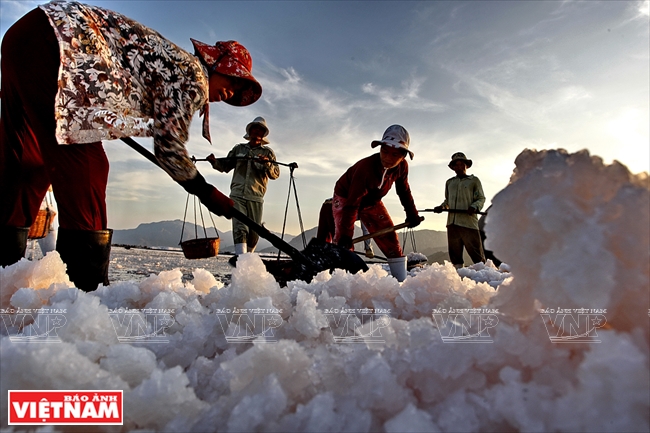
Quynh Luu, the largest salt hub in Nghe An province, has successfully exported salt to Europe and Asia. Photo: VNP
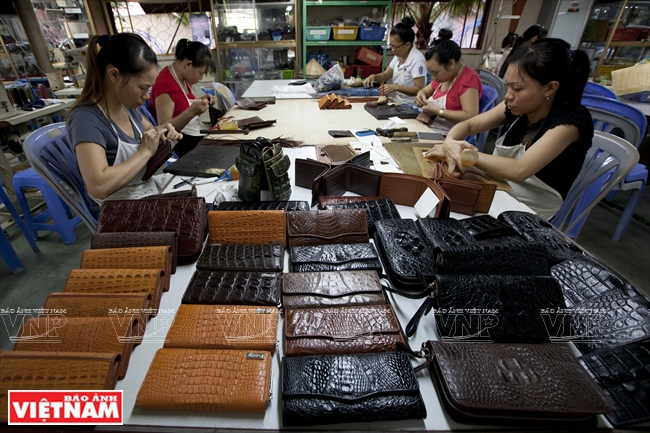 Tanned leather products for export to the EU. Photo: VNP Garment exports are estimated at 35 billion US dollars this year, 1 billion US dollars higher than expected. Photo: VNP
Garment exports, mostly to Europe, reached 16.5 billion US dollars in the first six months of 2018. Photo: VNP
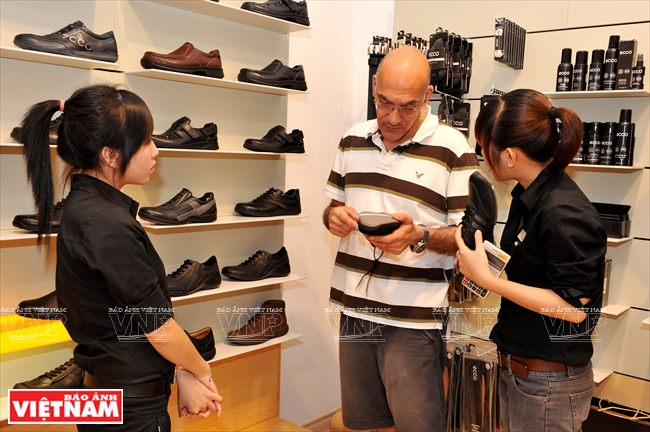 The EU is Vietnam’s second largest footwear export market which makes up 30.6% of the total footwear export value. Photo: VNP |
Germany, the UK, the Netherlands, Italy, France, Spain, Austria and Belgium are Vietnam’s largest export markets in EU, with an annual value exceeding 1 billion US dollars. Vietnam’s main exports to the markets are textiles and garments footwear, coffee, seafood, computers, and phone components.
The two sides have been actively promoting the signing of the EU-Vietnam Free Trade Agreement (EVFTA) and the Investment Protection Agreement (IPA).
By the end of August 2018, 24 out of the 28 EU member nations had invested in Vietnam with 2,141 valid projects worth about 24.17 billion US dollars.
The EU is now the largest provider of non-refundable aid for Vietnam. In 2014-2020, the EC pledged 400 million EUR in aid for Vietnam, focusing on sustainable energy and institution. As planned, the EU will spend about 350 million EUR on supporting projects covering energy saving, renewable energy and rural electrification in Vietnam.
Story: VNP - Photos: VNA & VNP

